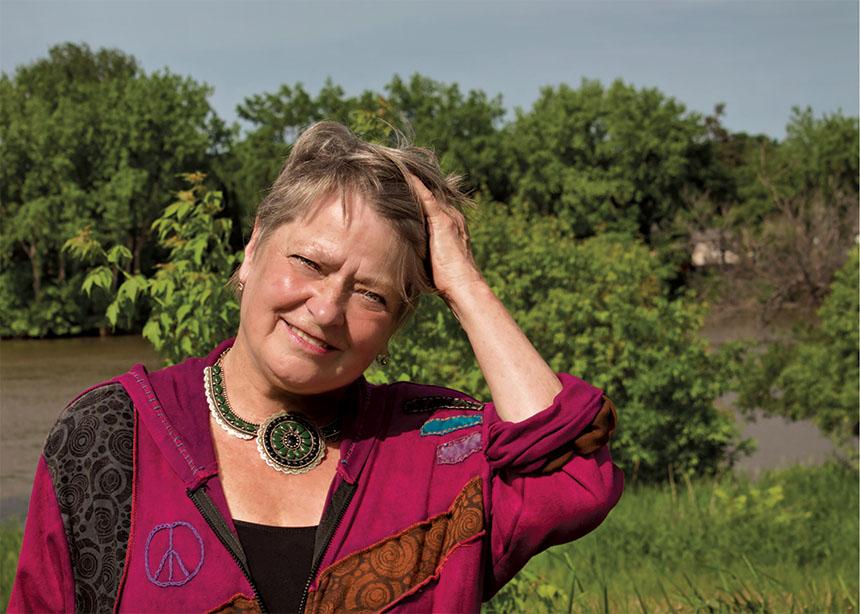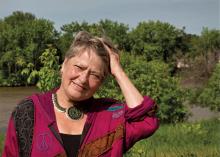For Di Brandt, being a poet is a natural extension of her upbringing in the Manitoba Mennonite village of Reinland. She says the hymns of her youth were poetic, and poetry was part of sermons and family life.
Speaking by video from her home in Winnipeg, Brandt says she was “brought up in the old way” of having to memorize poems and recite them to her grandmother on holidays and her birthday.
From early on, poetry was a “natural inclination” for Brandt. “It was just natural for me to become a poet,” she says. As a child, and well into her adult life, she wrote poems privately, secretively. She had a drawer full of poems that she kept to herself.
Since publishing her first book of poetry, questions i asked my mother, in 1987, Brandt has published 12 more books, including poetry, fiction and essay collections, some in collaboration with others. She has won much recognition for her work. Her awards include Gold and Silver National Magazine Awards, the McNally Robinson Manitoba Book of the Year, the Canadian Authors’ Association National Poetry Prize and two Governor General’s Award for Poetry nominations, among many other honours.
Most recently she received the 2023 Manitoba Arts Award of Distinction for “the highest level of artistic excellence” in her province, and her “contribution to the development of the arts in Manitoba.” The prize, awarded by the Manitoba Arts Council, comes with $30,000.
Brandt’s latest book, The Sweetest Dance on Earth (Turnstone Press, 2022), is a new and selected collection of her poetry, stretching across her career, from the deep curiosity of her childhood as expressed in her early writing, to the joys of watching her own children grow, all while investigating what it means to be Mennonite and how to relate to the world in honest, curious and loving ways. The breadth of her work addresses many subjects, including a celebration of the Canadian prairies, and intercultural and environmental concerns.
Embrace or exclusion
From her home communities in Manitoba, the response has been different. Despite accolades from the literary community, posts at several universities, and guest residencies in Germany, Scotland, New York and Switzerland, it took 50 years for the school from which she graduated—Canadian Mennonite Bible College (CMBC), now Canadian Mennonite University (CMU)—to officially invite her back to do a reading. That happened last year. She had spoken at the school previously, but she says last year was the first official invitation from faculty.
The relationship between Brandt and the Mennonite church-based communities of Manitoba has been fraught. As she gained her literary voice and vision, the church did not accept her message, which sometimes scrutinized the suppression of women’s ideas and expressions. Her questions and creative vision were not welcome.
Timing
Brandt reached high school the first year that school buses ran from her village to the high school in nearby Winkler. Then she graduated from high school the year that the federal government started offering student loans for postsecondary education. This enabled Brandt to become “financially independent” at age 17. She did not need permission to go to university and could choose to study what she liked.
Brandt says this was “an incredible thing” for her, coming from a village in which “the women were not allowed to speak in public or have their own money or really have their own opinions, or make all that many choices about their lives.”
While attending school in Winnipeg, she found herself divided in two. She was a villager who had lived close to the land as part of a tight-knit community, and she was a woman who was learning to navigate public transit, speak with strangers and attain postsecondary education. The move from Reinland to Winnipeg was a “huge leap” from a traditionalist, close-to-the-earth society to a modern, cosmopolitan, urban space.
“Inside myself, I never stopped being that barefoot peasant village person,” she says, but she was also learning to live in a world that knew nothing of that village life. It was “incredibly bewildering,” she recalls.
Brandt needed to weave these two selves together to become a professional literary writer.
While studying at CMBC, she was actively encouraged to become a literary writer. However, after the publication of her first poetry collection some years after graduation, she was not welcome back at the school. Like other Mennonite writers at the time, she found herself unwelcome in her home community, church and extended family.
Brandt says there was mostly a “defensive response” to her writing among her home communities. Some people felt that dealing with patriarchal abuses and other issues she raised would threaten the safety of the community, with its separatist values.
She says, “it wasn’t so much the ‘message’ [of her work], it was being the first one to step out in these ways. I could have said anything in my writing and it would have been the same. It was the reaching out, the inventing of new roles and functions for women, that was the issue. The subject matter and the ‘message’ was secondary, though of course looking back we can easily see how they were related to one another.”
“I was accused of trying to destroy the fabric of the culture, that I was trying to defame the church leaders,” she recalls. For villagers who had tried hard to live under the societal radar, appearing in books and in the media was jarring. “I understand what a big shock it was,” Brandt says repeatedly.
New Mennonite writers
With the publication of questions i asked my mother, Brandt became part of the early movement of what came to be known as the “new Mennonite writers,” a group of poets and novelists in Winnipeg who were trying to name their dual identities and experiences as Mennonites and as modern Canadians. In their unique ways, they have explored that upbringing, reflecting on the beauty and generosity of it while also bringing light to the darker experiences within their communities and the Mennonite church in Canada. They do not write Sunday School material, but their stories are important reflections the church should hear.
She notes that “the Mennonite churches and colleges elsewhere in Canada and widely across the U.S. gave a much more nuanced response to the new Mennonite writing of Manitoba. The International Mennonite/s Writing conference that began at Conrad Grebel College in 1990, and publications like the Mennonite Quarterly Review and the Journal of Mennonite Studies have developed extensive languages of appreciation and study of the new Mennonite writing, and it would be great if the Manitoba Mennonite churches and colleges could do the same.”
Modern-traditionalist dialogue
While modernity was encroaching on the Mennonite communities in Manitoba at a bewildering pace, Brandt says she and the other new Mennonite writers were “trying to make sense of those changes as they were happening.” In fact, they “wanted to preserve some of that traditional sensibility” amidst the change. “We were actually conservationists in many ways,” she says.
She reacts to those who mock traditionalism as regressive in itself. “I don’t think that is true either,” she says. Brandt sees value in some of the ways that traditionalist values push back against the “excesses” of the modern and postmodern world. She says this is “a good time to champion some of the traditionalist ideas, such as living simply, valuing local community, cherishing music and poetry, and staying close to the earth.”
Some years ago, while teaching at Brandon University and living in southwestern Manitoba, Brandt tried attending a Mennonite church there in hopes of rebuilding some connection with her heritage. She wanted to “make peace with it,” and she was warmly welcomed by the people there. “That was very tender for me,” she says. But over time, she learned people in the church expected her to repent of her writing. “I couldn’t do that. My writing has my heart and my soul and my love in it.”
Brandt suggests we need to figure out how to have good dialogue between the modern and traditional, “as is happening in many other communities, such as for example, First Nations in Canada and elsewhere.” She calls for “habits of respect” that celebrate writers for their hard work and creative vision. She calls for the development of intelligent responses to Mennonite writing as constructive alternatives to shunning and vilification.
Brandt chose to leave the church, but she says people like her should be able to speak their truth without needing to leave, face vilification or repent.




Add new comment
Canadian Mennonite invites comments and encourages constructive discussion about our content. Actual full names (first and last) are required. Comments are moderated and may be edited. They will not appear online until approved and will be posted during business hours. Some comments may be reproduced in print.